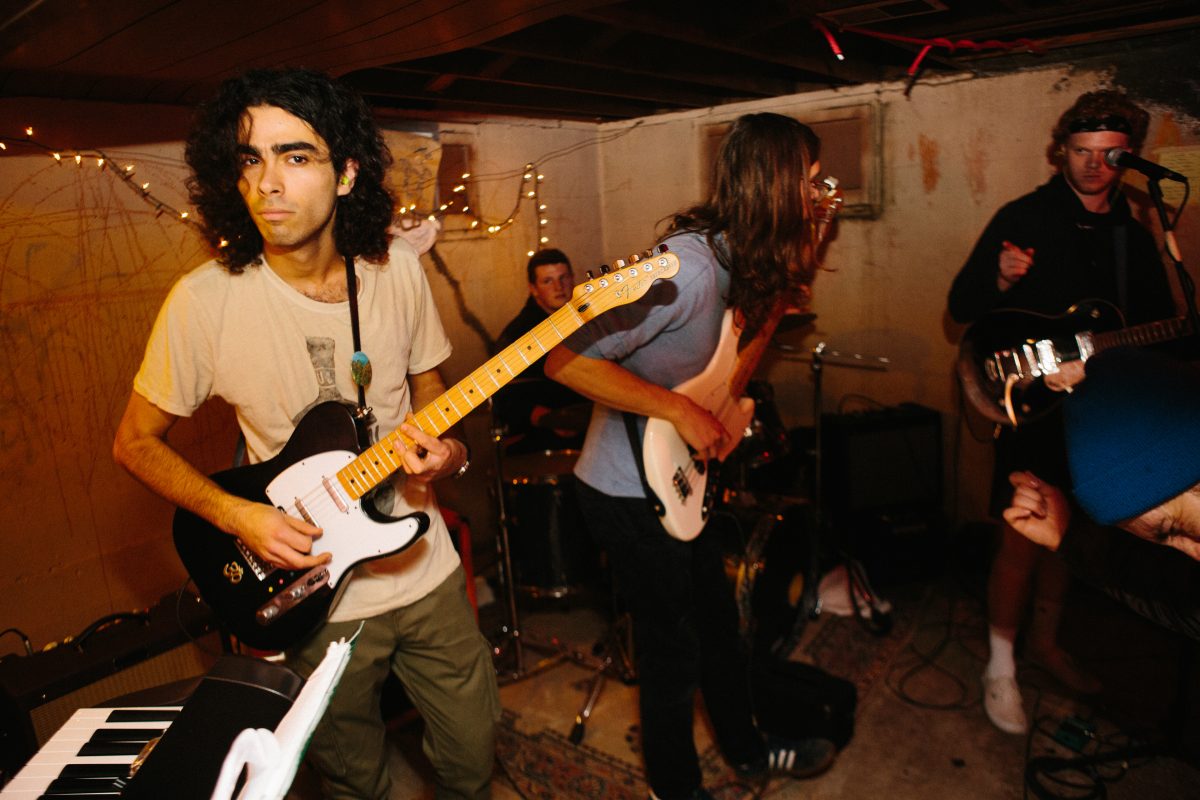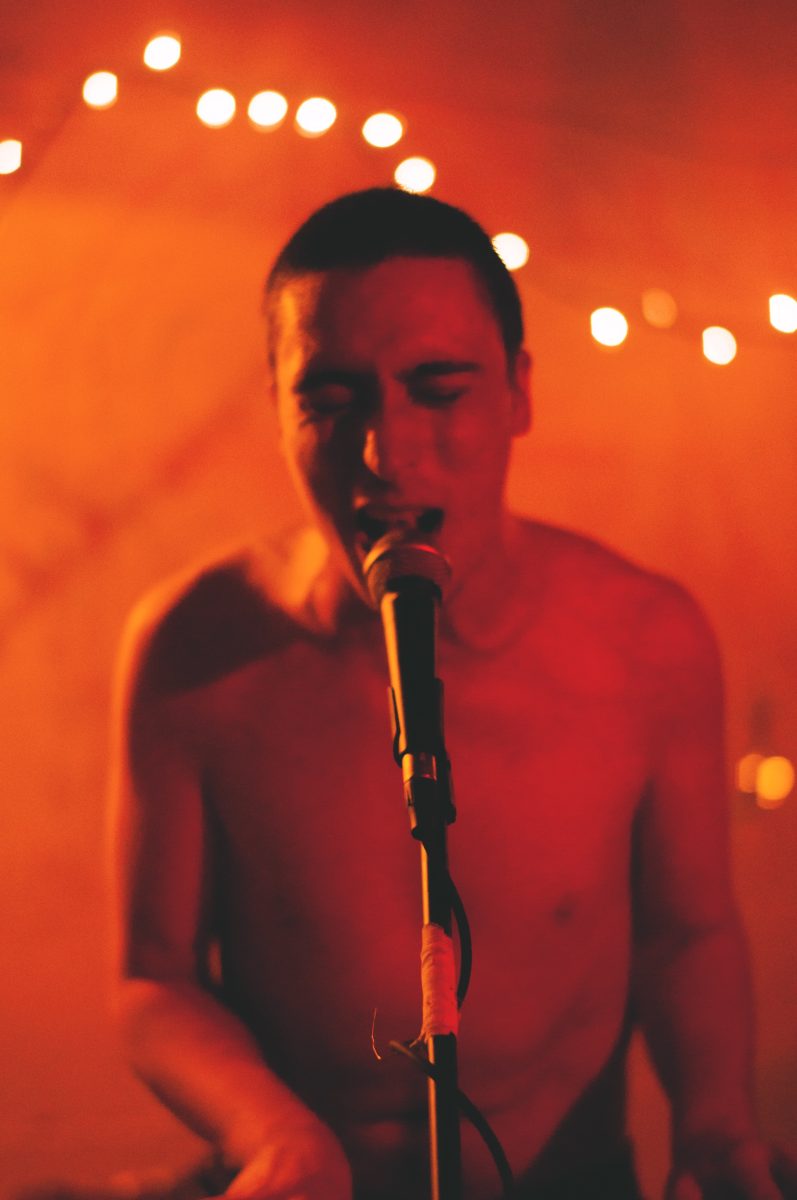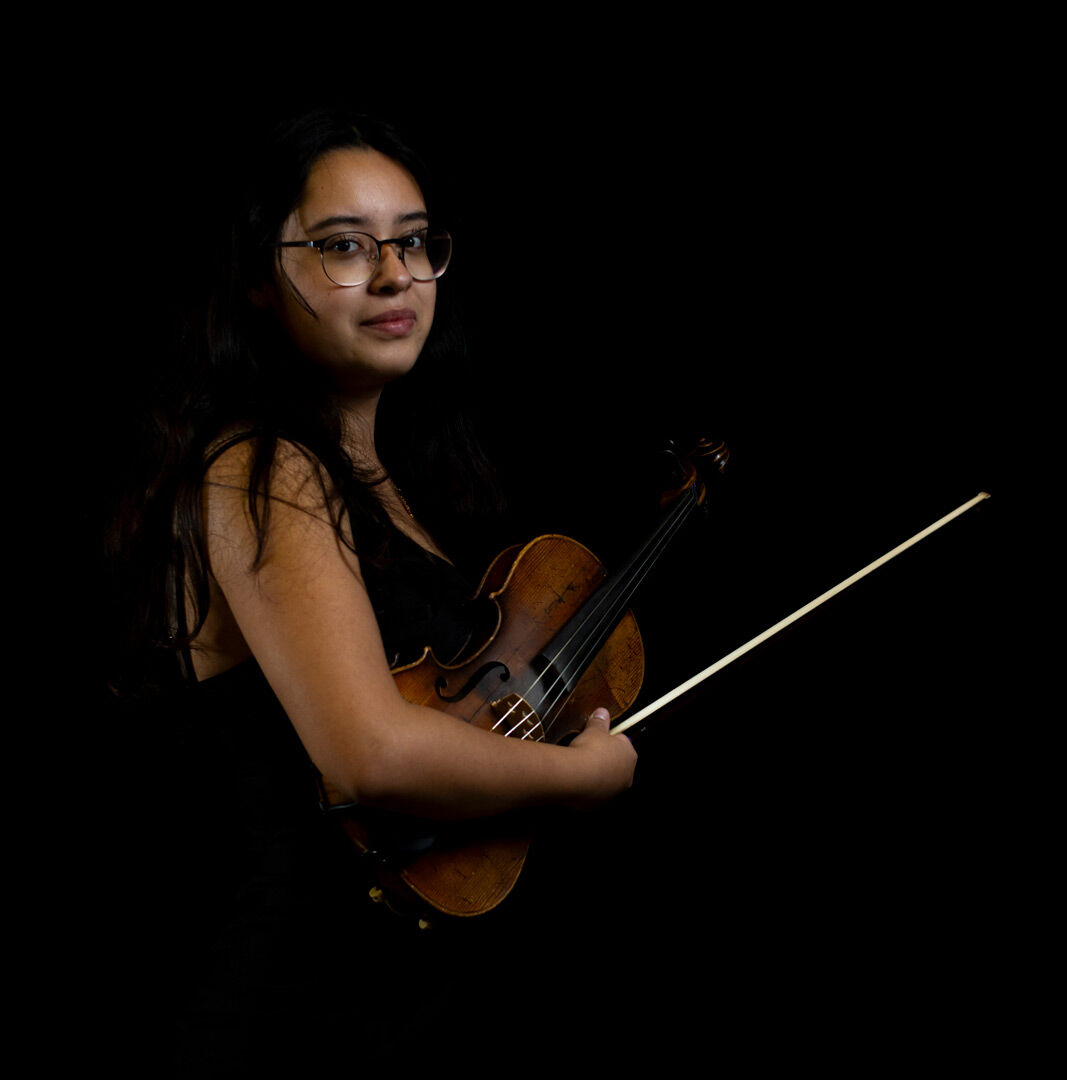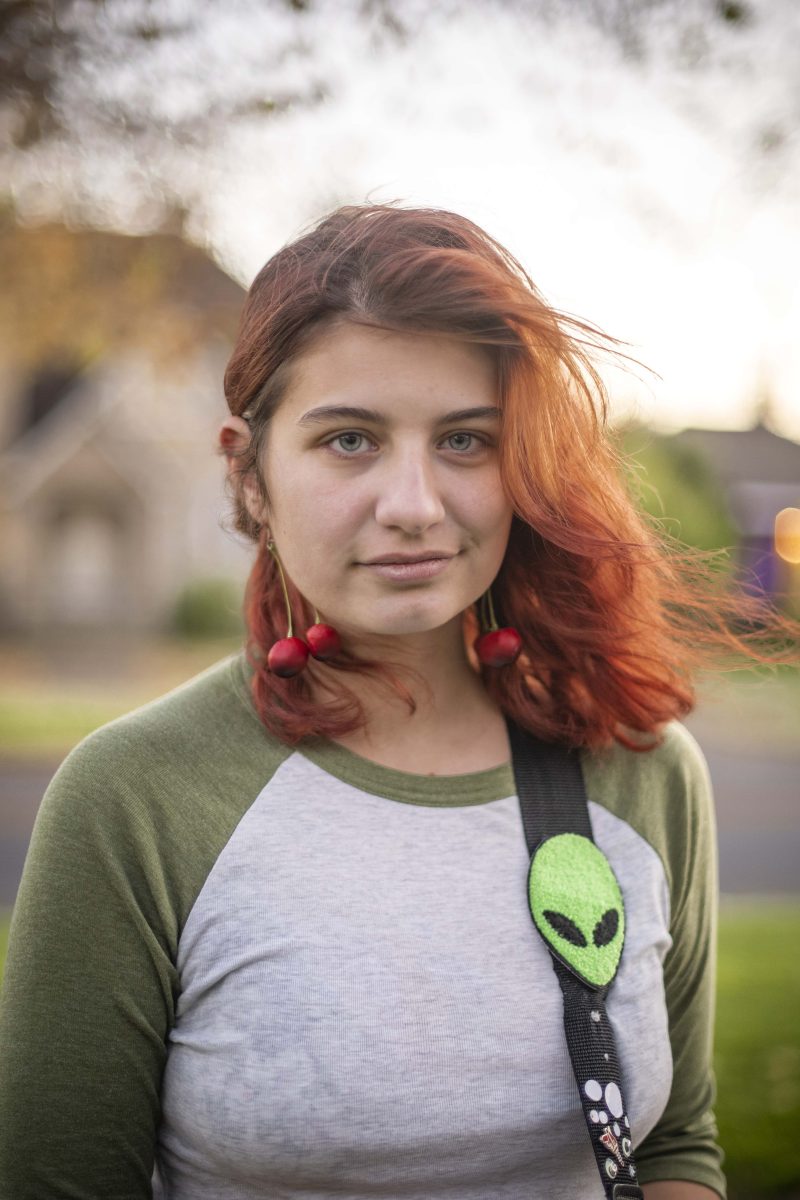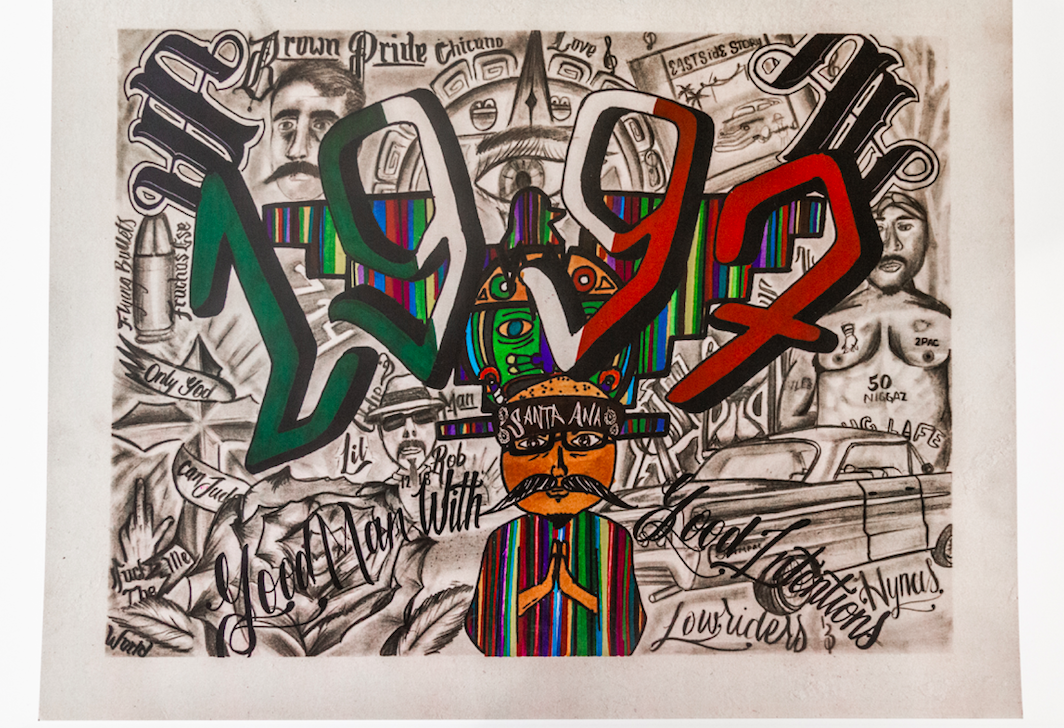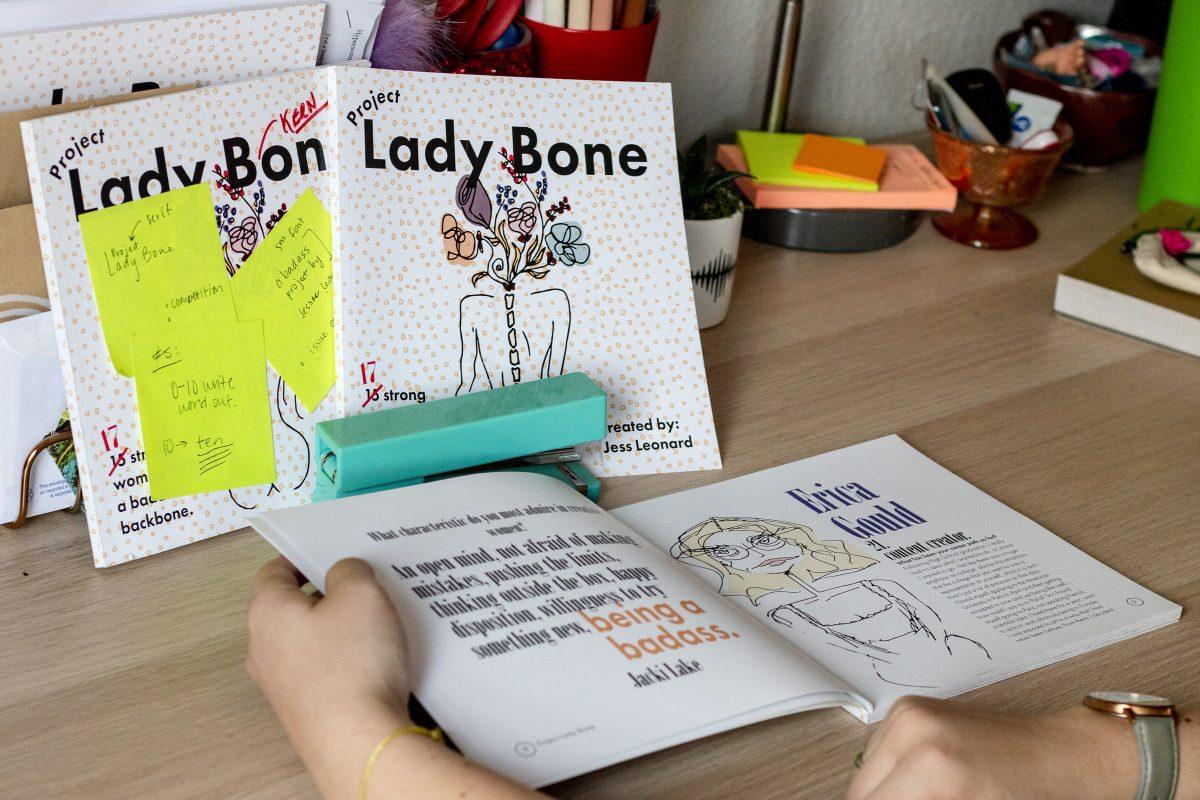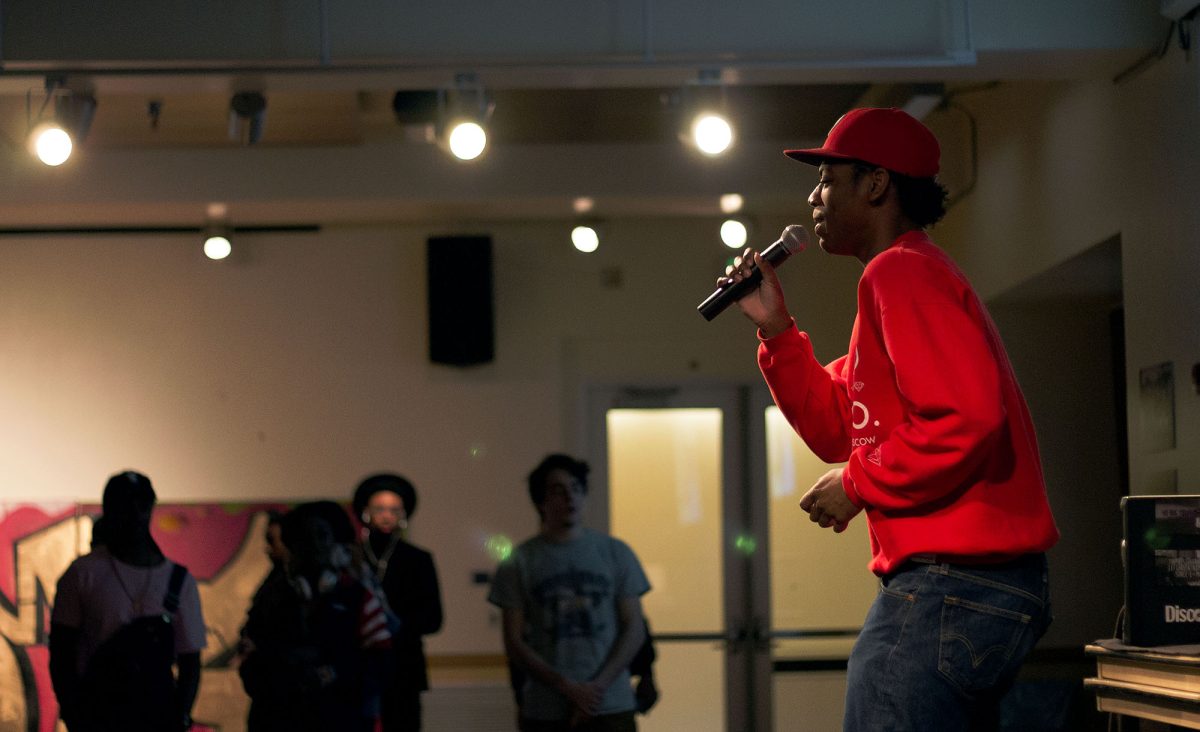Words by Hannah Steinkopf-Frank, Photos by Will Nielsen and Phillip Quinn
Nick and Calvin Pollard have spent weeks planning the perfect house show with their roommates. Black tarp covers the floor of their Fairmount Neighborhood house, and all the furniture has been moved out of the living room. Christmas lights have been strung up, and they’ve blocked off the bathroom because of a septic issue. But there’s tension with the five bands playing that night over set times. The first band doesn’t want to start while no one is there, but the roommates don’t want the music to go too late.
Soon, though, fans start filing in, escaping the cold November night. It’s 9:00 p.m. and everything is going right. The show is a benefit for the Standing Rock protesters demonstrating against the construction of the Dakota Access pipeline (DAPL), and partygoers put donations in a toy safe. The first band, an experimental duo called Trampolines, is finishing its set. Sam Mendoza moves with his bass like it’s his dance partner while drummer Alistair Gardner partially hides his face with a red bandana.
Suddenly, blue and red lights break through the curtained windows. It’s the Eugene police. One of the neighbors has filed a noise complaint and to avoid any fines or police action, the music has to end. Now. As quickly as the room was packed, it disperses, with around 30 people leaving the house in a matter of minutes, their bottles of beer and wine in tow.
But it isn’t time for the music to end. Daniel Bromfield of the band Punisher, which was set to play later that night, decides to bring the show to his house, which is just a block away. In just 30 minutes, the couches and tables that filled Bromfield’s living room are replaced with instruments, cables, and about 50 people jamming to Quinn Wise and the Heads Up, a band of University of Oregon students. The cops never come back, and the hosts raise over $200, with bands playing until after midnight.
This sort of DIY passion is what’s behind the regrowth of Eugene’s house show scene. Live music has always been a part of the city’s artistic culture. But since the passing of the 2013 Ordinance on Unruly Gatherings, commonly known as the Social Host Ordinance, — which holds hosts of events criminally responsible if parties become out of control — many students and community members have been nervous about turning their living spaces into concert venues. While there have been several high profile busts of house shows, individuals and groups like the Campbell Club and the Oregon Voice are increasingly bringing musicians and their fans into their houses.
Despite the warning, Calvin Pollard says they still plan on putting on more events. For many who host house shows, the possibility of police action is a risk they are willing to take. Violating the Social Host Ordinance comes with a $375 fine, and while the Eugene Police normally give a warning with a first noise complaint, further complaints can result in arrests.
For the Eugene Police Department, this presents a unique problem, as they have to address both a rise in party-related offences while retaining trust in the community. According to the police, from 2014 to 2016, there was a 28 percent increase in noise complaints in the neighborhoods surrounding the University of Oregon. Lt. Doug Mozan, who regularly runs the Department’s Party Patrol, says that due to a lack of resources, it’s often a guessing game whether the police will come to a party. If there hasn’t been a noise complaint and the police don’t see any of the signs that could lead to a violation of the Social Host Ordinance, it can go on.
“It’s not any different then when I go fishing,” says Lt. Mozan. “Sometimes you pick the right spot, and sometimes you don’t.”
This year, the police didn’t come when the Campbell Club hosted its annual Halloween show. Outside, members of the co-op, one dressed in a neon green full body suit and another as Franzia boxed wine, took donations that went towards maintenance of the house and paying the bands. People relaxed on the porch, smoking and talking in chairs and a hammock.
Inside, couches were moved out of the spacious living room and Punisher performed to a small crowd on the plywood stage. The crowd moshed and sang along when Bromfield played the poppy “I Don’t Give a Shit,” banging on the piano while screaming, “I don’t give a shit about the Ducks!” Elsewhere, attendees played pool and talked in the designated safe space, where there was water and zines about social justice issues.
“The band can be absolutely horrendous, and people will still dance their asses off and have smiles on their faces,” said Apbdard.
It was a calm night compared to one evening in Feb. 2013, when the Eugene police responded to a noise complaint at a Club show and arrested 23 people. According to the police, people were not complying with their requests and resisted arrest, but house members says they were worried about the officers coming inside. According to Waldo Przekop, a Club member who used to serve as the social chair and party planner, this fear continues today.
“Police are pretty terrifying, and they have always been, but now more than ever, we’re a safe space,” says Przekop. Even for those who don’t live at the Campbell Club, many say the 2013 raid discouraged people from putting on house shows.
For Lt. Mozan, the way police deal with parties has changed. “There was a time in history when we would surround the place and card everyone on the way out and write lots of tickets,” he says. “And we’re really not in that place. That’s not the way that we do business anymore.” Now, police are focused more on educating students, giving out warnings for first time party offenders.
Even with the threat of noise complaints, students are still putting on shows. Senior Artesia Apbdard has turned her home, known as “Narnia,” into a landmark for the growing house show culture. She says, though, that every single concert has been shut down by the police. She covered a wall of her house with the noise ordinances she has received and has no plans to stop throwing shows because she says going to them is like being around family.
“No matter how big the space is, there will be 30 to 50 people shoved in the corner, head banging and not giving a shit how hot it is or how sweaty it is,” she says. “And that’s what I love about house shows: the band can be absolutely horrendous, and people will still dance their asses off and have smiles on their faces.”
Lt. Mozan, though, says that overcrowding people into homes is one of the police’s concerns. Many students advertise their shows on social media, and it’s impossible to know how many people will come. In addition, he says that with all parties, police focus is on preventing sexual assault, alcohol and drug overdoses, and property damage.
For Miles Shepard, a junior, his decision to start putting on house shows this year was about creating a place for all students to feel comfortable. “I would actually argue that house shows are safer than most large gatherings of that size in Eugene,” says Shepard. “I think it’s just the nature of the fact that it is kind of an art happening, that people are interested in the music. They aren’t just trying to get destructively intoxicated.”
As the multimedia director for the Oregon Voice, Shepard has brought the magazine’s goal of highlighting local culture to his living room. On a recent Friday, Portland musician Jimmy Curry rapped about everything from internet surveillance to “Scooby-Doo” to his own insecurities. The audience, who danced with the high-energy musician, applauded when he rapped, “The cops won’t save you. The cops have guns.”
Three house shows in, Shepard hasn’t had any problems with the police, and he plans to host more. He believes the Oregon Voice is filling a gap in Eugene, which he says lacks enough venues to host the city’s bands. For Shepard, seeing his living room lit up with candles and crammed with musicians, equipment, and fans is surreal. “It’s honestly hard to believe that it’s even happening sometimes,” he says. “Watching kids find out about music that they might not know about also is really really cool. And just feeling like you’re making something happen is just in general really special.”
Many local bands have developed their sound and gained an audience through house shows, such as Spiller, which is made up of University of Oregon students. “At a house show, it’s more about the energy, ultimately,” says Spiller guitarist Sam Mendoza, who also plays in Trampolines. “It’s more about having that face-to-face connection, people just literally pressed up to you. Maybe you have a shitty, sloppy set, but you’ve had fun.” The group estimates it has played upwards of 50 house shows since forming in 2014, something that has shaped its music.
The trudging drumbeat on the band’s song “Happy Songs Sound Sad” was inspired by the long improvisations they often experiment with at house shows. While Mendoza says the group’s self-described “emo jazz sound” doesn’t seem like it would fit at parties, he and the rest of the band love performing at them.
This is a feeling that Lt. Mozan can relate to. He has played jazz piano since “before [he] could stand” and uses music to decompress. He says, “The bottom line is that nothing feels more awesome than playing music live.” Still, he highlights that it comes down to being a good neighbor and respecting the wider community.
For many hosts, despite the possibility of police intervention, putting on a show is still worth it. Performing in his own house after the Standing Rock event had moved there, Daniel Bromfield of Punisher wore a pale blue dress reminiscent of Little Bo Peep that only stayed on for half the set. In-between songs, over sloshing beer cans and buzzing amps, he preached the importance of creating art and having safe places for music.
“Maybe people feel like they’re part of a scene too,” he says. “People feel like they’re connected to something because a lot of the times, great music scenes start in basements and houses and DIY spaces. I’d like to dream that someday, this will be a legendary Northwest indie (music) scene and people can write books about it.”
Singer of Punisher sings his heart out to the crowd.


